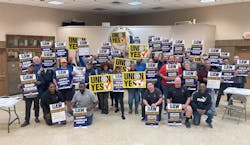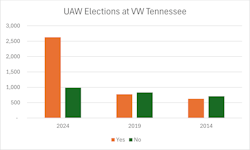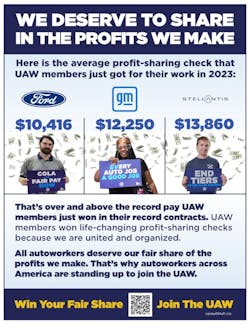UAW Organizes Volkswagen Plant in Tennessee in Blowout Vote
Third time was certainly the charm in the United Auto Workers quest to organize Volkswagen’s 4,300-worker facility in Chattanooga, Tennessee. The union won the election, held from April 17-19, by a massive margin—73% of voting workers approved membership.
Volkswagen issued a brief statement late Friday, thanking workers for participating in the vote, noting the strong turnout with 83.5% of employees casting ballots. Unofficial totals from the union show 2,628 yes votes and only 985 nos.
That’s a massive change from the last time VW workers voted in 2019 when anti-union forces won a much tighter race. This was the third union vote at VW Chattanooga. Workers also rejected joining the UAW a decade ago, but again by a narrow margin.
“This election is big,” Kelcey Smith, a worker in the paint department at Volkswagen, said in a statement released by the union. “People in high places told us good things can’t happen here in Chattanooga. They told us this isn’t the time to stand up, this isn’t the place. But we did stand up and we won. This is the time; this is the place. Southern workers are ready to stand up and win a better life.”
The VW win is a massive milestone for the union—its first successful organization of a plant outside of Ford, General Motors or Stellantis, despite decades of failed attempts at Volkswagen, Toyota and Nissan plants.
Labor experts had predicted that the union would launch a major organization/recruiting effort after last year’s highly successful strikes against Detroit’s automakers; strikes that produced the most lucrative pay and benefits that workers for the companies have seen in decades.
In November, Stephen Silvia, labor relations professor at American University in Washington and author of The UAW’s Southern Gamble: Organizing Workers at Foreign-Owned Vehicle Plants, said in an interview with IndustryWeek that those big contracts with Ford, GM and Stellantis would be “Exhibit A” for recruiting.
“They got something that really shows, ‘Here’s what a union and a group of organized workers can accomplish,’” Silvia said. The UAW “can now point to sizable compensation gains that management would not otherwise have granted.”
In the wake of those big contracts in Detroit, Toyota raised wages in Kentucky and Alabama, but its rates there are still below the UAW wage. UAW President Shawn Fain has been clear that he’s gunning for every company that makes cars in the U.S.
The union’s next test is next month at Mercedes’ plant in Alabama. Unlike at Volkswagen, where the UAW had several close calls, it hasn’t held an election with Mercedes workers having never collected enough signature cards to call for a vote in the past. In filing for next month’s election near Tuscaloosa, UAW officials say more than half of Mercedes’ workers have signed cards requesting to join.
Earlier UAW negotiations coverage:
- Mercedes-Benz Workers in Alabama File for Union Election
- UAW Files for Union Election at VW’s Chattanooga, Tennessee, Plant
- Ford Expects Higher Per-Car Costs than GM from UAW Deals
- GM Executives Detail UAW Deals’ $575-per-Car Costs
- The UAW’s Strike Win on Plant Closures Is Too Rigid
- UPDATED: UAW Members Ratify Contracts with GM, Ford, and Stellantis
- Expect More UAW Strikes, and Be Prepared
- What’s Next for the UAW? 5 Takeaways from Labor Experts
- Ford, Stellantis, General Motors Plant Investments Promised to Win UAW Contracts
- UAW 'Squeezes Every Last Dime' Out of GM in Strike Talks
- GM, Stellantis Reach Tentative UAW Deals
- UAW, Ford Announce Tentative Agreement, Ending Strike for 20,000
- CFO: GM Will Need to ‘Look at Efficiencies Across the Board’ After New UAW Deal
- UAW Launches 2nd Surprise Strike, This Time at Dodge Ram Plant
- UAW Takes Swing with Surprise Strike at Kentucky Truck Plant
- UAW Strike Update—A New Strike at Mack Trucks, But No New Detroit 3 Sites
- UAW President Announces New Strike Targets
- UAW Workers Want Work-Life Balance. It's Exactly What the Industry Needs
- The UAW Strike Is a Test Case for Biden-omics
- UAW Expands Strike to 38 GM, Stellantis Parts Distribution Centers
- The ‘Unprecedented’ UAW Strike Was Very Predictable
- UAW Strike Update—Ford, GM Lay Off Workers
- Opinion: UAW Punches Well Above the Belt in its Stand Up Strike
- UAW Strike All But Certain
- What’s the Deal with the UAW Contract Talks? Labor Negotiations Explained
- UAW Votes to Authorize Strikes Against Big Three
About the Author
Robert Schoenberger
Editor-in-Chief
LinkedIn: linkedin.com/in/robert-schoenberger-4326b810
Bio: Robert Schoenberger has been writing about manufacturing technology in one form or another since the late 1990s. He began his career in newspapers in South Texas and has worked for The Clarion-Ledger in Jackson, Mississippi; The Courier-Journal in Louisville, Kentucky; and The Plain Dealer in Cleveland where he spent more than six years as the automotive reporter. In 2014, he launched Today's Motor Vehicles (now EV Manufacturing & Design), a magazine focusing on design and manufacturing topics within the automotive and commercial truck worlds. He joined IndustryWeek in late 2021.




